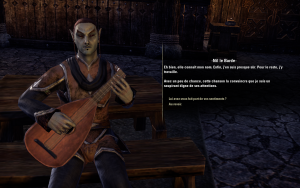It’s not as dark as it sounds, although it is most definitely as nerdy as it sounds.
There are numerous strategies for learning languages, but perhaps the most effective strategy is total immersion. That is to say, learning a language is easiest when you’re constantly forced to use it because no one around you understands your first language. In fact, linguist Stephen Krashen developed the input hypothesis in the 1980s based on the idea that immersion is literally all that a learner needs. But how can one achieve the same effect in a place that is distinctly not immersive? One solution I’ve found is to use online worlds.
I’ve been playing massively multiplayer online games (MMOs) since the 90s. These games are played exclusively online with hundreds to thousands of other players in giant worlds filled with interactive characters (NPCs). Currently, I play one called The Elder Scrolls Online (@joshisanonymous if you play yourself), which is an online version of a very popular single-player role-playing game (RPG) series. What’s special about this game, besides its fun high fantasy setting and game mechanics, is its extensive use of voice-overs for NPCs, available in French. In fact, not only will basically every NPC speak to you in French, but their dialogue is also displayed in written form.
Since this is interactive, NPCs generally speak one to three sentences at a time before allowing you to respond. This has the effect of providing regular amounts of linguistic input in chunks that are small enough to process, with an answer key when you can’t figure out a phrase. All of this is also provided within an activity which you would naturally be drawn to partake in. My personal experience has been that this helps greatly with listening comprehension. It even provides an opportunity to learn new vocabulary about an activity you are naturally inclined to talk about–I know the French word for ballista now, which may not seem useful, but it is when you play a lot of video games.
This environment could potentially lead to many interactions with other French speakers, as well, although The Elder Scrolls Online doesn’t seem to be particularly adept at grouping speakers of the same language together. Still, one could potentially join a guild of players who speak French in order to play through all the in game activities in an immersive way.
Obviously, this is not as effective as real life language immersion because you can’t simply spend every hour of every day playing games–I mean you could, but you probably shouldn’t. However, it is a reasonable compromise.
I intend to have regular posts like this, explaining creative learning strategies for acquiring a language.

Recent Comments